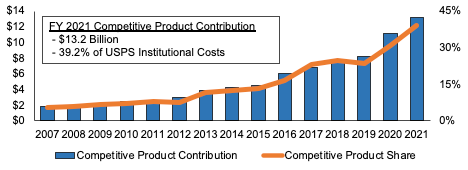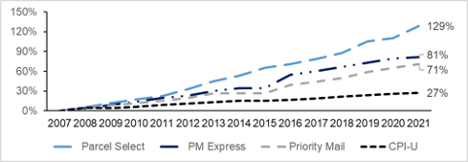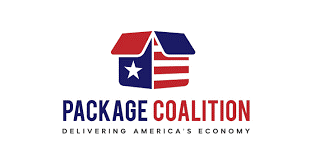The Package Coalition works to preserve an affordable, reliable and profitable postal package delivery system as an essential part of America’s infrastructure and economic growth.
April 22, 2021
About the USPS Board of Governors
This morning the Senate Committee on Homeland Security & Governmental Affairs will hold a hearing on President Biden’s nominees to become Governors for the U.S. Postal Service. Ahead of the hearing, here’s what you need to know about the Board of Governors:
“The Package Coalition commends the Postal Service for embracing the importance of investing in the future to maintain a 6 to 7-day-a-week integrated delivery network for mail and packages. We look forward to continuing our work with policymakers and the Postal Service to preserve an affordable, reliable and profitable postal package delivery system.”
The Basics
- Up to 9 governors on the Board
- Appointed by the U.S. President, confirmed by the Senate
- The Board was established by 1970’s Postal Reorganization Act
- Governors can serve up to 7-year terms; no person may serve more than 2 terms
- Up to 5 of the 9 governors may belong to the same political party
- Appointments are made when there are vacancies or for the remainder of an unexpired term
- The Board meets regularly; all meetings are open to the public
- 6 governors are needed to achieve an ordinary quorum
Board of Governors Responsibilities
- Elect the postmaster general — only the Board has the power to remove the postmaster general
- Direct the powers of the Postal Service
- Direct and control its expenditures
- Review USPS practices
- Conduct long-term planning
- Set policies on all postal matters
Biden’s Board of Governors Nominees
Anton A. Hajjar – former general counsel to the American Postal Workers Union
Amber F. McReynolds – currently the CEO of the National Vote at Home Institute
Ronald Stroman – previously served as Deputy Postmaster General and Chief Governmental Relations Officer for USPS
Current Board of Governors Members
Ron A. Bloom, chairman (D) – appointed by President Trump and confirmed by the Senate in 2019, Bloom was unanimously elected by the Board to become Chairman in February 2021.
Roman Martinez IV, vice chairman (R) – appointed by President Trump and confirmed by the Senate in 2019, Martinez was unanimously elected to serve as Vice Chairman in February 2021.
John M. Barger (R) – appointed by President Trump and confirmed by the Senate in 2019, Barger will serve for the remainder of a term that expires in December 2021.
Robert M. Duncan (R) – appointed by President Trump and confirmed by the Senate in 2018, Duncan previously served as Chairman until February 2021. His term expires in December 2025.
Donald L. Moak (D) – appointed by President Trump and confirmed by the Senate in 2020, his term expires in December 2022.
William D. Zollars (R) – appointed by President Trump and confirmed by the Senate in 2020, his term expires in December 2022.
Strong 2021 Numbers for Ecommerce Demonstrate Need for Affordable, Reliable Package Services
NRF: Strong Retail Sales Expected With Increased Vaccinations & Government Stimulus
“The dramatic increase of nearly 18% in March retail sales over the same period last year confirms that a confident consumer is driving the economic rebound, and that should continue through the remainder of 2021,” said NRF President and CEO Matthew Shay. “American households are clearly feeling the full effect of additional fiscal stimulus, gains in the job market and the reopening of the economy. Although there have been some recent issues related to vaccines, consumer confidence remains high and an optimistic outlook for the future continues to grow. Retailers remain committed, transparent and emphatic about prioritizing customer and employee safety as they welcome shoppers back into their stores this spring.”
Mastercard Report Reveals “E-Commerce a Covid Lifeline for Retailers”
With consumers kept at home throughout the pandemic, a new report from Mastercard found that ecommerce comprised $1 out of every $5 spent on global retail in 2020 — compared to $1 out of every $7 in 2019.
- Approximately 20-30% of the pandemic-related shift to ecommerce is expected to be permanent
- Essential retail sectors like groceries saw some of the biggest growth in ecommerce; 70-80% of the shift to grocery ecommerce will likely be permanent even beyond the pandemic
- International ecommerce grew by as much as 30%
- Consumers are purchasing at a larger number of websites and online marketplaces than ever before
Delivering The News: What We’re Reading
The Package Coalition is an alliance of America’s top retail, e-commerce and logistics companies committed to preserving reliable and affordable postal package delivery services. The Postal Service delivers packages directly to the doorstep of more than 161 million delivery addresses across the country, contributing trillions of dollars to the US economy and supporting millions of jobs and small and medium sized businesses.
Keep up with the Package Coalition by following us on Twitter (@PkgCoalition) or visiting our website.







